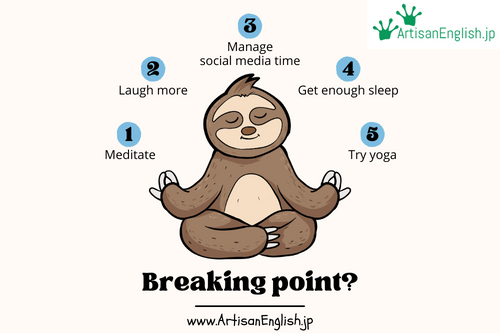
YouTube / iTunes / Spotify / Radio Public / Pocket Casts / Google Podcasts / Breaker / Overcast
Listen to ArtisanEnglish.jp posts & lesson intros here.
Wotd: Breaking point
Everyone has a breaking point beyond which you can go no further.
Know when to slow down and take a break before pushing yourself and others past that limit.
The breaking point is defined as the point of collapse or exhaustion.
It is when a person can no longer tolerate or cope with stress and pressure.
Pushing yourself and others beyond the breaking point can lead to severe consequences.
It can cause physical and mental health problems, such as chronic fatigue, anxiety, depression, and burnout.
When you reach your breaking point, your body and mind tell you that you must stop and take care of yourself.
It can be challenging to recognize when you are approaching your breaking point.
This is why you have to learn to listen to your body.
In today’s fast-paced world, there is often a culture of pushing yourself to the limit, and we are encouraged to work harder, longer, and faster.
It is easy to get caught up in this hustle culture and forget to care for ourselves.
It is essential to prioritize self-care and take breaks when needed.
I, for one, firmly believe in listening to my body.
If, for example, I oversleep, which I rarely do, I accept it as my body telling me I need more sleep, and I don’t stress out about it.
Sometimes, you have to take time off to refresh and re-energize.
Not only is it crucial to take care of yourself, but it is also essential to consider others.
Pushing others beyond their breaking point can lead to resentment, burnout, and, in Japan, even death.
Japanese even has a word for working yourself beyond your breaking point and to death – karoshi.
Whatever you are working for, it’s not worth pushing yourself too far.
Know where your breaking point is, and never go that far.
Nothing is worth making yourself sick over because if you don’t have your health, you have nothing.
Flesch-Kincaid Readability Test
This post is understandable by someone with at least a 7th-grade education (age 12).
On the Flesch-Kincaid reading-ease test, this post scores 71.
The easier a passage is to read, the higher the score on a scale of 0 – 100.

